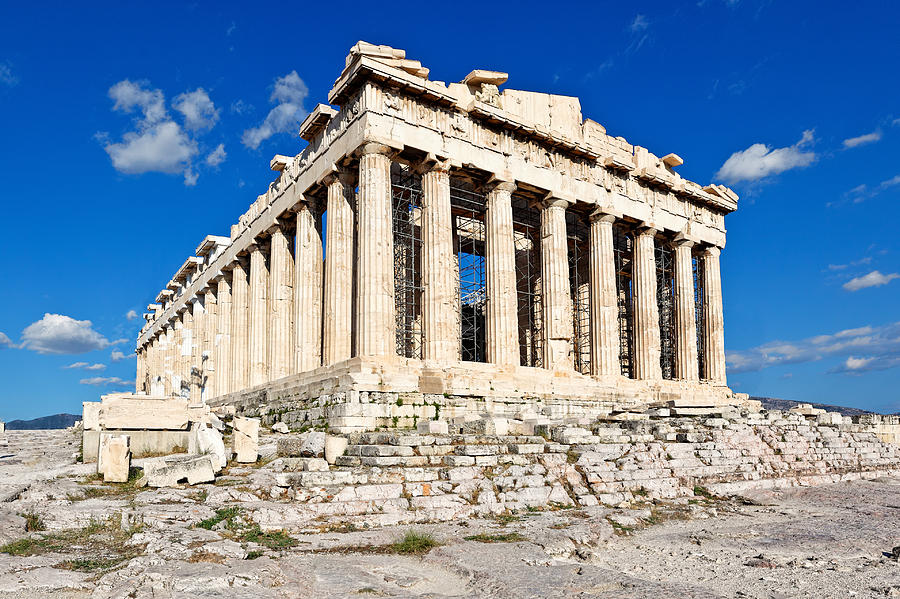|
home | what's new | other sites | contact | about |
||
|
Word Gems exploring self-realization, sacred personhood, and full humanity
return to the main-page article on "Clear-Thinking"
Professor Daniel N. Robinson, Georgetown and Oxford Universities: How did the ancient Greeks manage, almost single-handedly, it seems, to create what we call philosophy? Why is it that the beginnings of so many subjects find their roots in the Hellenic world? (Notice how so many college textbooks begin discussion with credit to the ancient Greeks in terms of origin.) Various theories are advanced: there was an abundance of sunshine; a plentiful fish diet was most healthful; slave labor made possible ample leisure time -- none of these explanations are at all satisfying: Pharaoh had no shortage of sunshine, but Egypt is rather lean on philosophical thought; other lands had managed to create reliable food sources, and slave labor was common pretty much everywhere in the ancient world.
the Greeks were religious but had no oppressive religion But the Greeks, it seems correct to assert, were different from all others in one area: The ancient Greek world never had a state religion, no state-sponsored priesthood; instead, it had competing schools of thought - which refined and sharpened their knowledge; but the polis was never completely secular either; rather, there was an "extraordinary integration of the secular and the devout." The ancient Greeks, it might be said, had a "religious attitude, but not a religion, as such." to ascribe infallibility to any source, be it person or holy book, is to pervert the process of the search for truth Prof. Robinson continues: There is a "relationship, in any society, between the epistemological ['deciding what's true and real'] authority conferred on religious figures and the philosophical vitality of that age ... If you are fairly satisfied that the most burning questions are best answered by going to an authority [an oracle, a saint, a guru, a wise man] ... [then] I submit that the philosophical dimensions of that culture will be fairly fragile, if present at all. "There's something about philosophy that is at once humanizing and utterly human; for, when the oracles have failed us, when saints have grown silent, and when God has chosen not to reveal himself, then we must stand back in the dark shadows of confusion and fear and ask, What sort of being am I? What sort of life is right for me? ... "The philosopher doesn't enter the arena of philosophy devoid of belief, purpose, plan, aspiration and values - all of that is in place; but there are those moments when we say no matter how much this means to me, no matter how centered my being is on this pattern of beliefs, no matter how close, emotionally, romantically, I am to those who hold these convictions, I'm going to be skeptical about those statements, I'm going to plumb the depths of those arguments to see finally what their true value is." To do otherwise, you are, as Plato said, a puppet on a string, a slave. Editor's note: As I survey the great thoughts of history, I am impressed by many things, but one principle asserts itself continually: true progress, the advancement of humankind, takes place only when the dignity and sanctity of personhood is honored. Religious persons are so often threatened by philosophy, this wine of the Devil, they say - but why should this be so? to accept that God might have intended for men and women to actually use their high-powered faculties of reason - to learn, to plan, to make mistakes, to reason, to fail, to try again - and in this process become more godlike. Instead, errant true-believers often reduce "faith" to a mindless exercise of blindly obeying whatever self-styled authorities serve up as definitions of "the truth." Prof. Robinson: "When a culture takes the position that the problem of knowledge is essentially a religious problem; when it invests its credulity in a denominated group of official interpreters whose judgments on matters of this kind are taken to be dispositive - then, "the only thing left for scholarship is to interpret the words of the wise. So the entire debate becomes, not about the nature of truth, but, what Smith meant when he said 'X,' granting that Smith is the [infallible] repository of all truth." Editor's note: All this is great insight by Dr. Robinson. See the implications. You’re not allowed to disagree with the elites in any cultish group – be it despotic religion, materialistic science, censoring academia, dark politics, or even the autocratically-run family. Each one of these, with arrogance, makes claim to the truth, to being “right” with all others as “wrong.” But notice. Even though each claims to possess exclusive title-deed to the truth, there is no truth-seeking as such within their ranks. Instead, there is much talk about what “Smith meant when he said X” about the truth, “given that Smith is the repository of all truth.” The discussion is not about the truth per se – which, if honored, would condemn the group and its elites – but only what the elites say about the truth; carefully crafted to support the elites' totalitarian agenda. In other words, “the truth is whatever we say it is, and we will attack you if you disagree”; and, if rule of law did not prohibit and offer penalty, they would kill you for being so “wrong” as to think otherwise. The unstated dictum issuing from all of these, all true-believer spiders' nests, is that the individual matters for nothing; that the only opinion worth listening to is that of the local cult chieftain and that truth will die with him. In another lecture, Dr. Robinson offered additional insight regarding the unique contribution of ancient Greece to intellectualism. Babylon, Egypt, the Orient and other civilizations of antiquity had their own achievements; indeed, the Greeks learned much from their neighbors, especially the Egyptians. Even so, all this acknowledged, Greece brought to human advancement things never seen before. Dr. Robinson informs us: the first time in history... “With Greece we get the first evidence of a thoroughly self-critical perspective on one’s own basic knowledge claims. We find in the ancient Greek world, in the world of thought, the first evidence of a people actually recognizing their deepest convictions, their deepest sentiments, as subjects for critical appraisal and study. “The famous inscription at Delphi, the temple dedicated to Apollo – gnothi se auton, “know thyself” – is rich and subtle in meaning … [the famous proverb offers mandate to] know the kind of being you are, understand the kind of life that’s right for you, understand the relationship in which you stand to other beings, and to the world, and to the cosmos. So this is the fruitful foundational period for what we take to be the [modern] academic and scholarly subjects. “The greatest debt ancient Greek thought has to all sources is the debt it has to Homer (9th - 8th century BC), the blind poet, whose name means ‘hostage.’ [Leaving aside interminable debates about the identity or historicity of Homer, let us acknowledge] the importance of the Iliad and Odyssey, epic poems that conditioned the ancient Greek mind to think of certain issues and to think about them in a certain ways… “The very first word of the Iliad is ‘anger’ – menos, “noble anger” … This is an epic about how our emotions, flying in the face of good counsel and prudence, can find us immersed in what is nothing less than a tragedy. It’s a kind of ancient version … of what in the 17th century would have been called an ‘emblem book,’ a kind of Pilgrims Progress. “And so when the Greek world would recite passages from Homer over the evening fire, it was with the intention of raising their children in a certain way, to attach them to certain values and understandings. Homer’s epics are the background conditioning for much that would come to be the formal philosophical and psychological thought of the classical world… “In every stanza [of Homer] we find some reference to motivation, to what it is that is moving one. [In this] there’s always the recognition that ‘behind the screen’ the gods are working their will though human affairs. They may have contempt for us, they may have love for us … [but] their [grand] life is lived for the sheer pleasure of it. [They are removed from threats of death, are more than we, and so] we seek their favor. there are no once-and-for-all answers “But, [in all this reverential deference,] know this about the gods: none of them is omniscient; none of them knows the future … And so we have, even in the pre-classical religion of the Greek-speaking people, sufficient flexibility such that there is no divine scriptural body, textual body, traditional body, that can be consulted to answer questions once-and-for-all. don't ask Pharaoh questions he can't answer “There’s a very, very happy blending of this rather open-textured theology which might be called the philosophical frame of mind. Ask Pharaoh the nature of meaning of something and Pharaoh will answer you [dogmatically] once-and-for-all. Well, that tends to be a debate stopper. There are no once-and-for-all answers in Homer or in the whole of Olympian divinities. This is an important factor” and becomes fertile field yielding a bountiful intellectual harvest. For this reason, almost any college textbook, on almost any subject, in its opening chapter, will pay homage to the investigative labors of the ancient Greeks.
|
||
|
|

